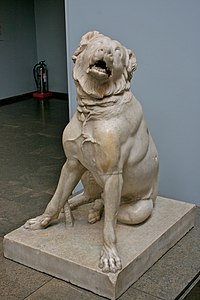Molossian
Appearance
English
[edit]The “Jennings Dog”, a Roman copy of a lost Greek bronze statue of the Molossian hound (sense 2), on display in the British Museum
Etymology
[edit]Noun
[edit]Molossian (plural Molossians)
- A member of the ancient Epirote ethnos which Olympias came from.
- A breed of large dog of classical antiquity native to Epirus, resembling a mastiff and used as a hunting dog and guard dog.
- Synonyms: Molossian dog, Molossian hound, Molossus
- 1896, Henryk Sienkiewicz, chapter LV, in Jeremiah Curtin, transl., “Quo Vadis.” A Narrative of the Time of Nero., Boston, Mass.: Little, Brown, and Company, page 432:
- But meanwhile a new grating was opened, and into the arena rushed, with mad speed and barking, whole packs of dogs,—gigantic, yellow Molossians from the Peloponnesus, pied dogs from the Pyrenees, and wolf-like hounds from Hibernia, purposely famished; their sides were lank, and their eyes bloodshot.
- 1975, Roger Longrigg, The History of Foxhunting, page 14:
- The hounds were Indian, Cretan or Locrian; there were also Molossians (mastiffs) and Spartans (big greyhounds).
- 2012, Michael Bryant, 28 Seconds: A True Story of Addiction, Tragedy, and Hope, Viking:
- One constituent spent an hour educating me on the history of pit bulls: the Molossians, the Mastiffs; the Greeks, Romans, Brits, Tibetans, and Germans; the crossbreeds. A common theme ran throughout their history: they were the fiercest of fighters, and eventually bred to fight—in wars during antiquity, in dog fights for centuries. Regardless, they were again and again attacking other dogs and people.
- 2017, Mary Dove, “Quintus”, in The End of Seven, Dog Ear Publishing, →ISBN, page 194:
- He loved dogs, indulged by Antius’ kennel composed of Neapolitan mastiffs and molossians, original Roman war dogs.
Translations
[edit]person from Molossia
|
Adjective
[edit]Molossian (comparative more Molossian, superlative most Molossian)
- Of or relating to Molossia or Molossians.
References
[edit]- ^ “Molossian”, in Dictionary.com Unabridged, Dictionary.com, LLC, 1995–present.
Further reading
[edit] Molossians on Wikipedia.Wikipedia
Molossians on Wikipedia.Wikipedia  Molossus (dog) on Wikipedia.Wikipedia
Molossus (dog) on Wikipedia.Wikipedia


